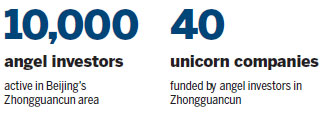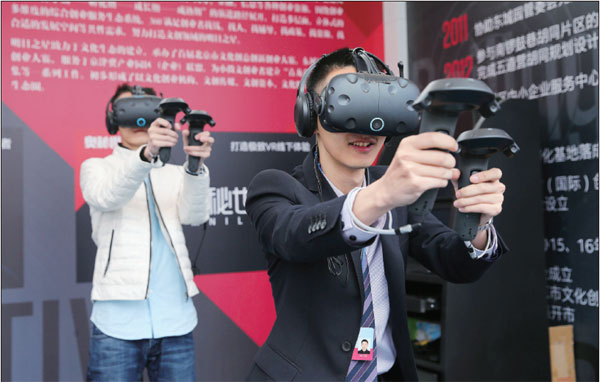China's Silicon Valley hosts more 'angels' and 'unicorns'
Mass entrepreneurship and innovation has become the new direction of social investment, resulting in a growing number of unicorn companies created in Beijing.
During the National Mass Innovation and Entrepreneurship Week started on Oct 12, many cities including Shenzhen and Beijing held more than 20 events such as forums and marathons.
Wang Yingjian, deputy head of the Beijing Municipal Commission of Development and Reform, said Zhongguancun, China's Silicon Valley, has built a showroom with an area of 7,000 square meters.
The entrepreneurs will be able to find partners or investors during the week's events.
Zhongguancun has more than 10,000 active angel investors, accounting for 80 percent of the total number in China. Those people have helped many startups to develop into major leaders in their respective industries.
The angel investors in Zhongguancun have helped to create more than 40 unicorn companies, including Beijing Orange Technology, which launched Didi Taxi and group-buying website Meituan.com.

The number of unicorn companies in Zhongguancun ranks second in the world, following the Silicon Valley in the United States.
According to the management committee of Zhongguancun, 2.3 billion yuan ($340 million) was invested in 379 cases for the first half year in Zhongguancun, accounting for around 46 percent of national cases.
These investors have brought mass entrepreneurship and innovation to a new level.
According to the committee, 6,005 technology companies were newly established within the first five months of 2016, which means 40 new companies launched every day. Approximately 90 percent of them are private companies.
So far, Zhongguancun has 287 listed companies. Many leaders of those listed companies, who have had successful experiences in the market, took on the role of angel investor.
Facing the macro economic slowdown, a large number of companies in Zhongguancun increased their investments in research and development, hoping to improve the industrial chain and raise their competitiveness.
Science and technology research spending has gathered in the artificial intelligence sector. In the first half of 2016, 31.88 billion yuan was invested in the sector, up 21 percent year-on-year.
Baidu Inc developed a self-learning platform which can help clients use the most advanced technology to gain access to big data analysis.
In addition to AI, investment in environmental protection and energy interconnection in Zhongguancun increased by 30 percent compared with the same period last year.
Beijing OriginWater PureTech Co Ltd, a company focused on solving water pollution problems and ensuring drinking water safety, will invest 5 percent of its revenue in membrane technology.
According to a report by the China Association of Enterprises and China Entrepreneur Association, China's top 500 companies' investment in R&D has increased 7.4 percent in August year-on-year.
The continuous investment in R&D has led to many achievements. Baidu has applied for 1,500 patents in AI and 358 patents in autonomous driving technology.
|
Visitors play a virtual reality game at the 2016 National Mass Innovation and Entrepreneurship Week in Beijing's Zhongguancun.Photos By Wang Zhuangfei / China Daily |
(China Daily 10/17/2016 page12)















